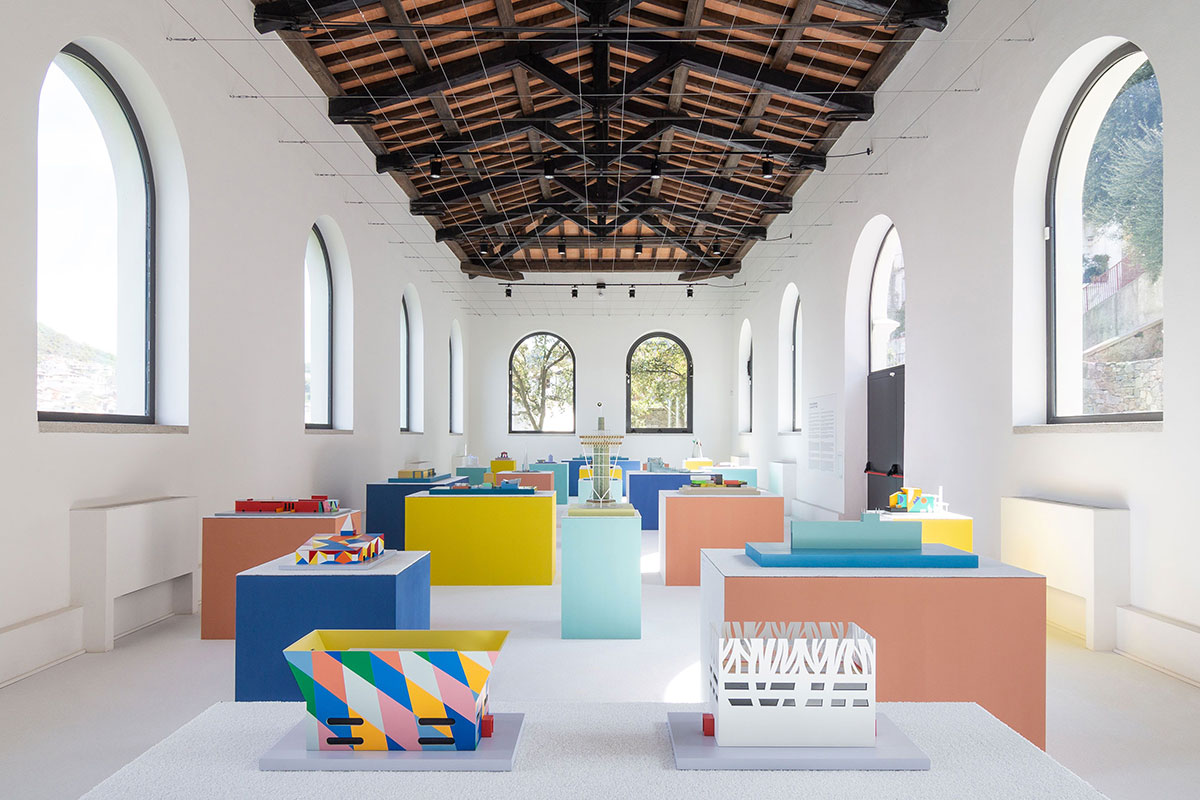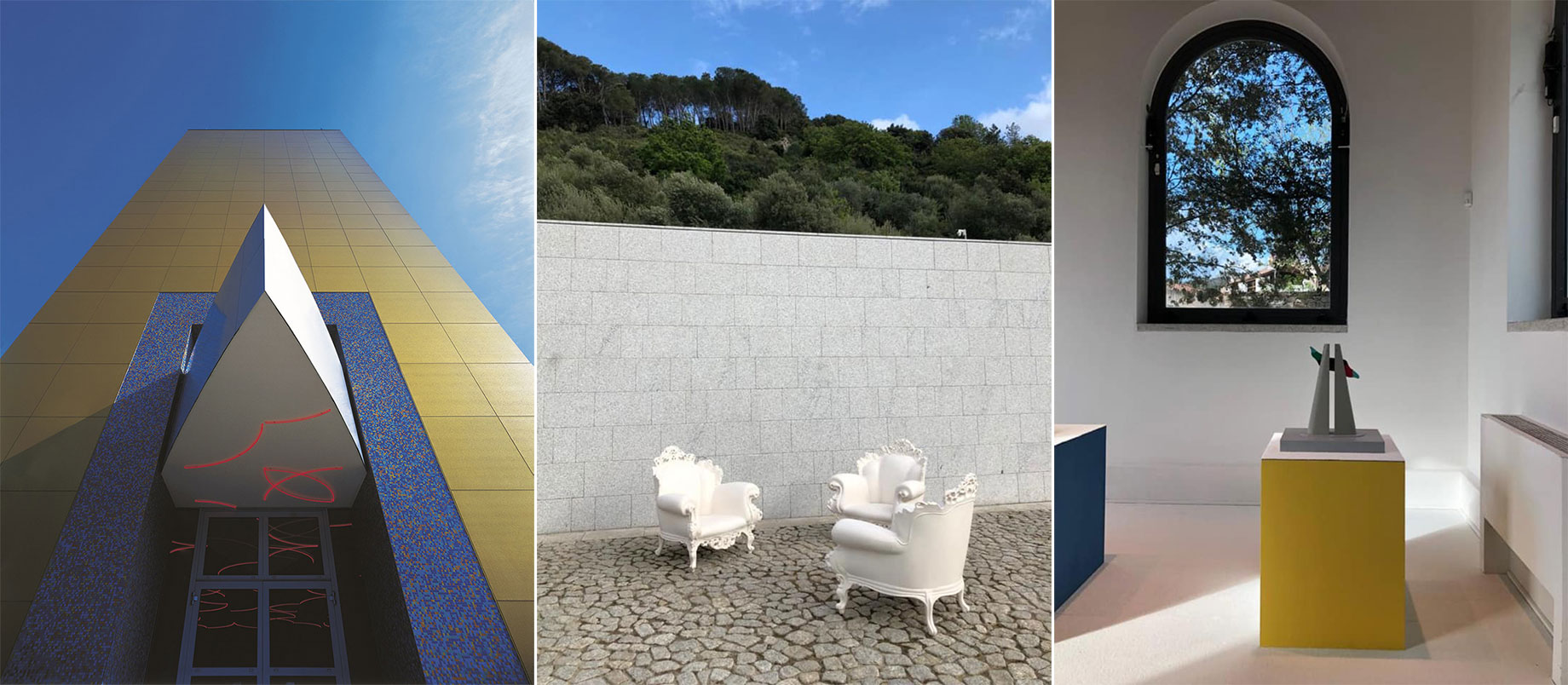ARCHITECTURE:Atelier Mendini Architectures
 The Milanese architect and designer, Alessandro Mendini, focused on neo-modern and contemporary design. The core of his research is design: furniture, interiors, architecture and installations. The common thread behind the multitude of Mendini’s projects is his eccentric flair for pairing contrasting elements and re-elaborating themes and ideas that appear antithetical.
The Milanese architect and designer, Alessandro Mendini, focused on neo-modern and contemporary design. The core of his research is design: furniture, interiors, architecture and installations. The common thread behind the multitude of Mendini’s projects is his eccentric flair for pairing contrasting elements and re-elaborating themes and ideas that appear antithetical.
By Dimitris Lempesis
Photo: Museo Nivola Archive
The Museo Nivola, paying homage to Alessandro Mendini (16/8/1931-18/2/2019), presents the outcome of fifty years of architectural planning: all Atelier Mendini’s public and private architectures, shown by 25 accurate wooden maquettes of 25 buildings, together with a related series of drawings. First presented the Triennale di Milano in 2018, at the Museo Nivola they relate to the simple and essential architecture of the exhibition space – once the public wash house of the village. Alessandro Mendini, architect, artist, designer, theorist and journalist, was born in Milan. After graduating in 1959 from the Politecnico di Milano he started his career in Marcello Nizzoli’s studio. In 1970 he left architectural planning to devote himself to architecture and design journalism: he directed “Casabella”, “Modo” and “Domus”, magazines through which he spread his ideas of transforming the world of the project. Together with Andrea Branzi and Ettore Sottsass, taking part in Global Tools and Radical Design, he was the main theorist and promoter of the renewal of Italian design during the 1970’s. In 1979 he joined Studio Alchimia, the radical design group that during the 1980’s alongside with Memphis, revolutioned the functionalist design, acting at the borders between art and design, hinting at pop culture and Kitsch. With Alchimia Mendini created objects, furniture, environments, paintings, installations, architectures. Among the most significant works of this period are the Groningener Museum and the reinvention of the corporate image of Alessi, for which he was artistic director. Francesco Mendini, architect, was born in Milan in 1939. He started his activity at Nizzoli Associates with architectural projects such as the new quarters, offices and social center for the Italsider in Taranto and other building complexes in Europe and North Africa. During the Seventies he also focused on engineering and constructions and he was advisor for several research institutes and for the Italian CNR. Within the Atelier he is responsible especially for architecture and the layout of interior spaces and exhibitions. In 1989 Alessandro and Francesco Mendini opened Atelier Mendini in Milan. The atelier designed Alessi’s factories and offices and the company’s Museo del Casalingo in Omegna; the Olympic swimming pool in Trieste; the renovation of the Villa Comunale and the stations Salvator Rosa, Materdei and Università of the underground in Naples; the offices of Trend Group in Vicenza; the conversion of an ex industrial site in a commercial and residential area in Milan Bovisa; the tower of Paradise in Hiroshima, the Groningener Museum in Holland, a neighborhood in Lugano; the Madsack building in Hannover and a commercial building in Lörrach, Germany. In South Korea the building of the Triennale di Milano in Incheon, now the flag building of a national broadcasting company, the Posco residential buildings in Seoul, the Observatory tower in Suncheon and the high speed trains terminal in Gwangiu. Atelier Mendini received the Gold Medal fo Italian Architecture in 2003 at the Triennale di Milano for the underground stations in Naples and the Villegiature Awards 2006 in Paris for the Byblos Art Hotel di Verona.
Info: Curator: Aldo Colonetti, Museo Nivola, Via Gonare n°2, 08026 Orani, Italy, Duration: 4/5-16/6/2021, www.museonivola.it


